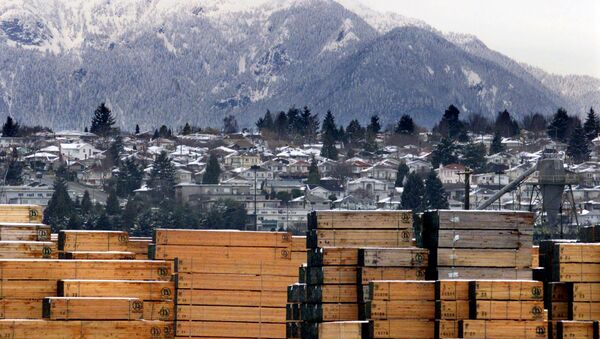A decades-running trade spat between the US and Canada has resurfaced to add to the challenges faced by the COVID-19 pandemic-rattled economy, reports Bloomberg.
As homebuilders struggle to manage the fallout from the health crisis, the softwood lumber dispute has been hiking up the expenses they face, David Logan, director of tax and trade policy analysis for the Washington-based National Association of Home Builders was quoted as saying.
Amid the lockdowns set in place to try and staunch the spread of the coronavirus epidemic, lumber mills in the Pacific Northwest were forced to cut production, with builders increasingly turning to Canada for wood supplies, says the expert.
With Canadian producers paying average tariffs of more than 20 percent on timber shipments to the US in line with the dispute between the two countries, this translates into an average price increase of about 8 percent that American builders are forced to shoulder, says Logan.
“The majority of homebuilders in America are truly small businesses, building fewer than 10 homes a year. So the effects that the pandemic has had on the economy make it a lot more difficult for builders to absorb those costs,” said the analyst.
According to industry experts, framing lumber accounts for about a fifth of the material costs that constructing a home entails.
Lumber futures have been rallying, soaring by over 70 percent since the four-year low on 1 April, driven by cutbacks at mills, as Americans gradually emerge from pandemic-induced stay-at-home protocols.
Lumber prices made a new 2-year high this morning. Complete retracement of the Covid drop. Last I checked, the Fed isn't covertly involved in overnight lumber futures.
— Rich Kleinbauer (@RMKOutFront) July 8, 2020
Should bolster construction/housing stocks. Oh, and it's an inflation leading indicator. At least it used to be pic.twitter.com/1GiSmH1yCL
Builders will be the ones forced to absorb surging expenses as the construction industry tops forecasts, said Logan.
In a move to support local producers, the Trump administration slapped punitive tariffs on Canadian softwood lumber in 2017, insisting the industry was unfairly subsidized.
However, domestic builders who receive over a quarter of their lumber from Canada have been reeling from the increased costs they are being forced to absorb.
Canada's lumber production increased 6.5% from February to 5 009.2 thousand cubic metres in March. Production was 7.9% lower than in March 2019, as Statistics Canada reported.
— Greenhouse (@Greenhousesib) July 7, 2020
Sawmills shipped 4 643.4 thousand cubic metres of lumber in March, up 12. https://t.co/IeZYY3RftG pic.twitter.com/ym4W7Jkj2c
Regarding the prospects of resolving the Canada-US trade dispute, Kevin Mason, managing director of Vancouver-based ERA Forest Products Research, suggests there is little hope for a breakthrough this year, citing the Trump administration’s focus on trade disputes with China, and strong prices.
“This thing is dead as a doornail for 2020… This year, there’s just no hope of anything getting negotiated,” said the expert.
The Trump administration hit Canada with stiff lumber tariffs of up to 24 percent in April 2017.
The duties were imposed ostensibly to create a level playing field for US lumber companies, which alleged that Canadian firms were provided with unfair subsidies by the Canadian government.
Canada’s exports of softwood lumber to the US were valued at $5.6 billion in 2016, according to the Commerce Department.
The dispute between the two states is deep-rooted, going back decades.
In the 1980s American lumber companies started claiming that Canadian companies have been unfairly subsidized by their government – accusations the Canadian side vehemently rejected - resulting in Washington imposing a 30 percent tariff on Canadian softwood lumber in 2002.
In April 2006, the United States and Canada announced a tentative settlement to end the dispute, with the Softwood Lumber Agreement (SLA) entering into effect in October 2006.
Both countries, in 2012, approved a two-year extension to SLA, with the terms stating the United States would lift countervailing and anti-dumping duties provided lumber prices continue to stay above a certain range.
Canada agreed to enforce the regulations, including taxes on lumber exports headed to the US.
However, the Softwood Lumber Agreement expired on 12 October 2015.




